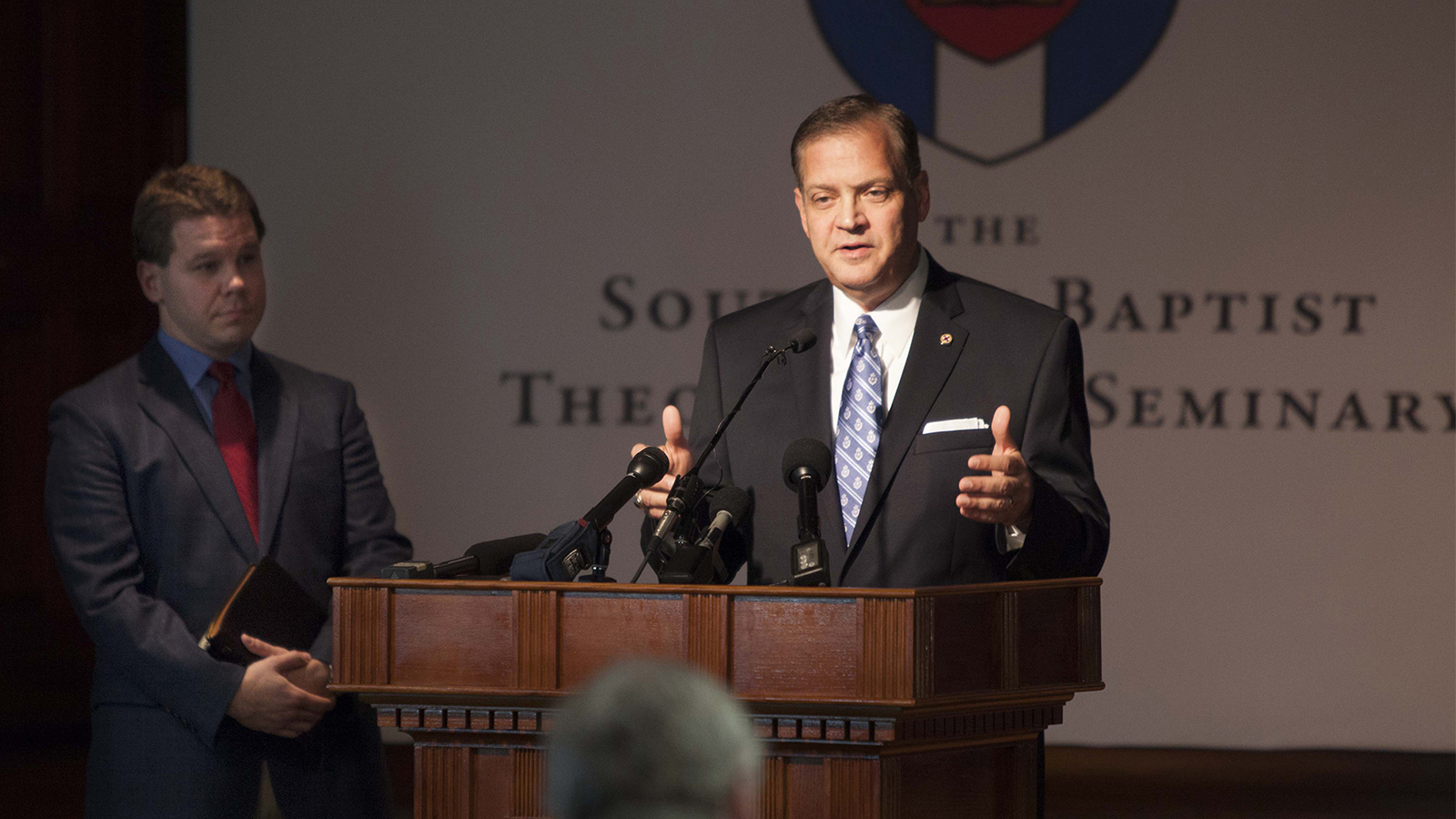R. Albert Mohler Jr., president of Southern Baptist Theological Seminary, speaks with the press on Oct. 5, 2015, in Louisville, Kentucky. Photo by Emil Handke, courtesy of Southern Baptist Theological Seminary
Need to know: Monday, May 18, 2020
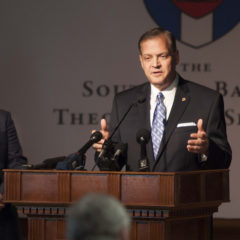
Al Mohler, Southern Baptist leader, says he was ‘stupid’ to defend slavery in 1998 CNN interview
The Rev. Al Mohler, longtime Southern Baptist leader, repudiated past comments defending slavery, calling them ‘stupid,’ says he is ashamed of seminary title with a link to slaveholder.
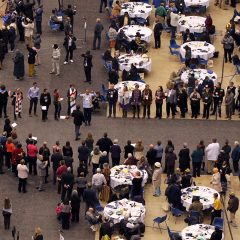
United Methodists would’ve met this week to consider a split. What are they doing instead?
Many US United Methodist leaders see the delay as a blessing, allowing more time and cooler heads to consider a split. Others are concerned about ongoing damage after decades of debate over the role of LGBTQ Christians in the church.
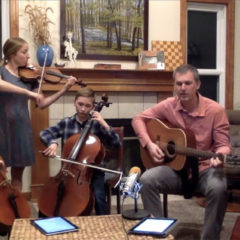
Clergy, scientists grapple with thoughts of worship without congregational singing
‘Singing together is a big deal,’ said a Philadelphia pastor.
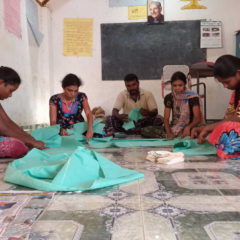
Pope Francis dedicates message to the internally displaced during pandemic
The coronavirus pandemic has heightened concerns for those who are internally displaced. They often lack health services and information to prevent the spread of diseases.

Let fat people speak for themselves — that’s the way you end ‘fatphobia’
I wish The Liturgists’ recent podcast episode had not just talked about fat people, but talked with fat people. I am, however, grateful for the conversations it has sparked, writes J. Nicole Morgan.
Remembering Georgianna Glose, a Brooklyn nun and activist
Georgianna Glose, an outspoken advocate for the poor and disadvantaged and a nun who sounded the alarm on sexual abuse in the Catholic Church, was a fixture in her longtime Brooklyn, N.Y., neighborhood of Fort Greene.
Latest news from RNS
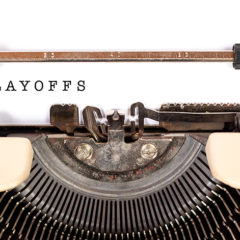
Reform Jewish umbrella group cuts staff by 20% due to COVID-19
The staff reductions by the Union for Reform Judaism, and the movement's overall financial situation, some experts say, are indicative of a broader pattern in American Judaism.
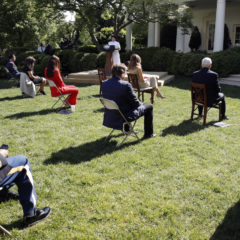
Poll: US believers see message of change from God in virus
NEW YORK (AP) — A new poll found that 31% of Americans who believe in God feel strongly that the virus is a sign of God telling humanity to change.

Q Ideas, Gabe Lyons host talk claiming essential oils can stop coronavirus
“A vaccine — again, that’s not the ultimate solution,” Joshua Axe said.
More views from RNS
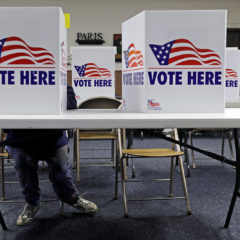
Voter suppression is a theological issue
(RNS) — Christian denominational and church leaders have sent a letter to every member of Congress calling voting a ‘sacred right.’
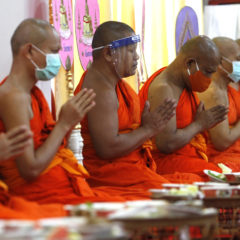
How do Buddhists handle coronavirus? The answer is not just meditation
For millions worldwide, Buddhist talismans, prayers and protective rituals offer a meaningful way to confront the anxieties of the global coronavirus pandemic, writes Pierce Salguero.
Weekend Plug-in: May 15, 2020
Editor’s note: “Weekend Plug-in,” featuring analysis, insights and top headlines from the world of faith, is produced by Religion Unplugged.
Like so many of her devoted readers, I miss the stellar journalism of Rachel Zoll, longtime national religion writer for The Associated Press.
But I have positive news to report about Zoll, who was diagnosed with brain cancer more than two years ago.
An MRI last week “showed no evidence of new tumor growth once again,” said Cheryl Zoll, Rachel’s sister.
Rachel has glioblastoma, or GBM, the aggressive and deadly cancer that claimed the life of Sen. John McCain in 2018.
https://twitter.com/JamesMartinSJ/status/1041172084859314176
The Religion News Association honored Rachel with a Special Recognition Award at its 2018 annual meeting in Columbus, Ohio. That same year, AP recognized her as one of the winners of the Oliver S. Gramling Awards, the global news service’s highest internal honor.
The reporter’s doctor indicated that in 90 percent of cases, “patients would be showing progressive disease by now,” her sister said.
“While we could, of course, see new growth at any time, Rachel has officially graduated into the class of people who are outliers with respect to survival,” said Cheryl, with whom Rachel is staying in Amherst, Massachusetts. “We'll take all the time we can get!”
Like many people during the COVID-19 pandemic, Rachel has been confined to walking around the neighborhood the last few months. But she has enjoyed receiving calls and notes from friends such as Richard Ostling, with whom Rachel worked on AP’s national religion team for years.
Power Up: The Week’s Best Reads
“Little Richard — the musician known for singing, shouting and flamboyant showmanship — was more than a little religious at times during his life,” writes Religion News Service’s Adelle M. Banks.
In the wake of the singer’s May 9 death at age 87, Banks offers a fascinating portrait of his complicated faith.
Not religion related but still interesting: The Tennessean’s obituary of Little Richard noted that although “he rarely made public appearances, locals would spot him on occasion — frequently in the drive-thrus of Wendy’s and other fast food restaurants on West End Avenue, where he’d give a friendly wave to fans.”
https://twitter.com/AMBankstw/status/1259960451452076035
Serena Solomon reports from Auckland, New Zealand, on how that nation “has so far deflected a COVID-19 crisis.”
“A key to that result has been the diligent work of New Zealand’s Māori and the Pacific Islander population who have at times been ahead of the government’s internationally praised COVID-19 response,” Solomon writes for Religion Unplugged. “Church leaders in these communities, like (Rawiri) Waititi, have been a powerful voice in calling their people to respond seriously to COVID-19 while generously caring for their vulnerable members.”
https://twitter.com/MichaelFieldNZ/status/1260317129112350720
After 10 years in Latin America, journalist Luis Andres Henao is doing excellent work as part of The Associated Press’ New York-based global religion team.
Henao collaborated with longtime AP national writer David Crary to report on two grieving Hispanic congregations — one a Catholic church in Queens and the other a Lutheran church in Manhattan. Between them, the churches have lost more than 100 members to the coronavirus.
In another compelling story this week, Henao and AP colleague Jessie Wardarski recount a young priest losing his mentor and his father to COVID-19.
https://twitter.com/sestapleton/status/1260175791184322561
More top reads: A biblical mystery at Oxford, Ariel Sabar, The Atlantic … Small churches are in particularly big trouble right now, Ruth Graham, Slate … Wrongfully imprisoned for decades, Jimmie Gardner is driven by faith and justice, Aysha Khan, Religion News Service … Clergy confidentiality at issue in Amish bishop’s case, Peter Smith, Pittsburgh Post-Gazette … Gearing up for big 'culture war' cases at U.S. Supreme Court, Richard Ostling, GetReligion … When is a Bible translation not a Bible translation?, Warren Cole Smith, MinistryWatch … Church gives away $125,000 to help cope with coronavirus, Marie Szaniszlo, Boston Herald … In inner-city black churches, more grief, fewer resources, stronger faith, Kate Shellnutt, Christianity Today … The pro-Trump conspiracy that’s becoming a religion, Adrienne LaFrance, The Atlantic … From flannelgraphs to Zoom, churches bring Sunday school home, Emily McFarlan Miller, RNS … Supreme Court returns to a complicated question: Which religious workers count as ministers?, Kelsey Dallas, Deseret News … Catholic bishop suspends priest and issues trespass order over blog about clergy sex abuse, Michelle Boorstein, Washington Post.
Inside The Godbeat: Behind The Bylines
I couldn’t help but chuckle at this tweet from Liam Stack, Metropolitan religion writer for the New York Times:
https://twitter.com/liamstack/status/1259504124057587712
Regular Weekend Plug-in readers may recall that the possibility of the apocalypse made the front page of the New York Times last month (via national religion writer Elizabeth Dias). The Washington Post’s Julie Zauzmer and Sarah Pulliam Bailey earlier reported: “This is not the end of the world, according to Christians who study the end of the world.”
Charging Station: In Case You Missed It
Here is where you can catch up on recent news and opinions from Religion Unplugged.
- Anti-Semitic incidents hit an all-time high last year, ADL report says (by Micah Danney)
- Examining the role of Catholic priests in the 2020 presidential race (by Clemente Lisi)
- British tabs use clickbait stories to intensify papal feud (by Clemente Lisi)
- How many nuns does it take to give women contraceptives? Precisely ‘none!’ (by Chelsea Langston Bombino)
- Israel launches investigation into evangelical TV channel (by Gil Zohar)
- New research says religion can prevent COVID-19 'deaths of despair' (by Micah Danney)
- African churches prepare for their next plague (by Erik Tryggestad)
- Inside the $100 million Russian church meant to honor Putin, Stalin and war (by Alexei Lidov)
- Modi government accused of 'witch hunt' against Muslim activists (by Avinash Giri)
- Liberty University makes cuts amid falling enrollment (by Warren Cole Smith)
- 2020 election will drive even more propaganda about religion (by Richard Ostling)
- Delivering sacraments in quarantine is forbidden for some, creative for others (by Terry Mattingly)





